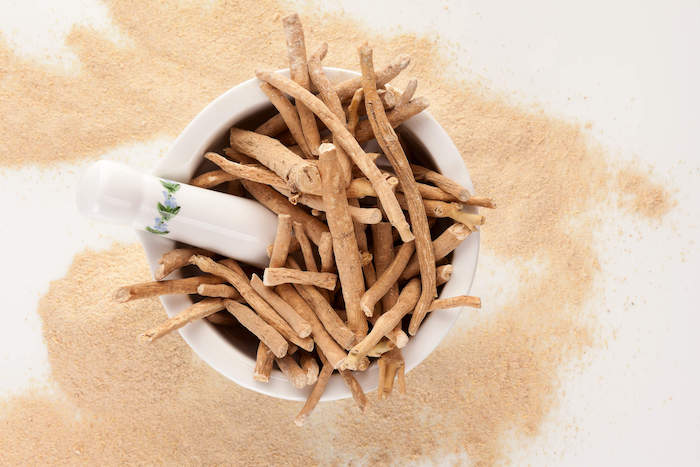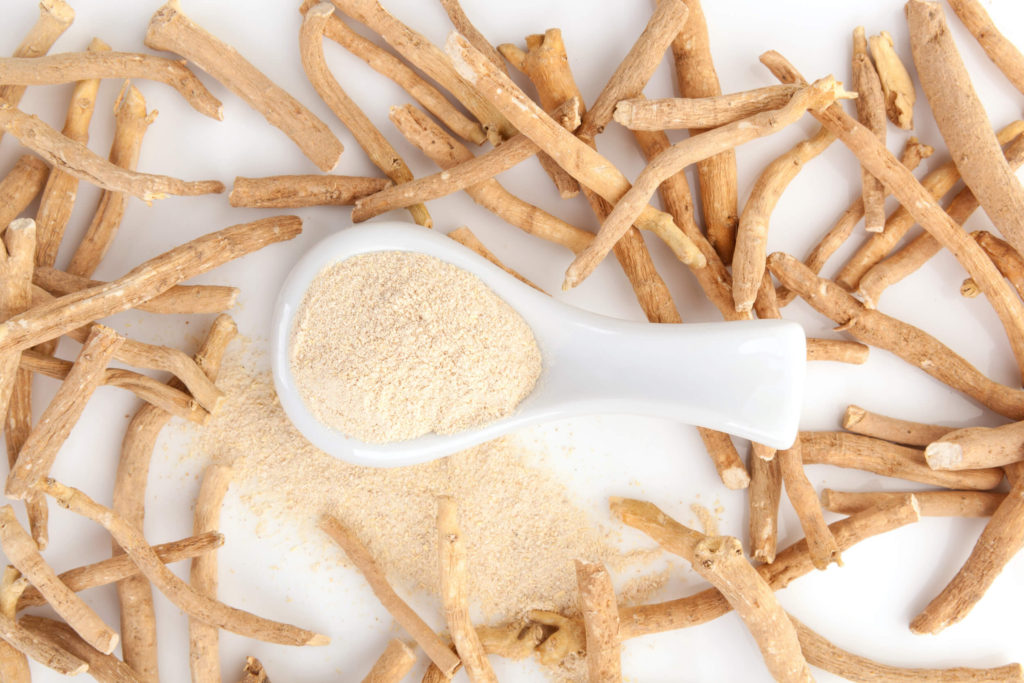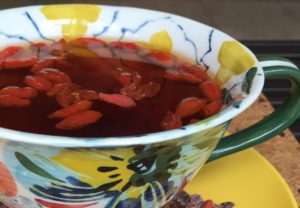Ashwagandha is a powerful adaptogenic herb employed in western Ayurvedic medicine to restore balance, strengthen the immune system, and aid well-being. Often referred to as Indian Ginseng or winter cherry, this powerful herb is also known by its scientific name of Withania somnifera. Its root has been widely, extensively studied and is scientifically proven to produce remedial effects for a variety of ailments, including stress, lethargy, and mental fog. The benefits of ashwagandha rival those of standard depression and anxiety pharmaceuticals, without the bothersome and often unpleasant side effects. Many living with stress, anxiety, depression, cancer, Parkinson’s disease, Alzheimer’s disease, or dementia have significantly benefited from adding this herb into their healing protocol.
Ashwagandha is a yellow-flowered shrub, related to everyone’s friend – the juicy tomato, that is traditionally found growing in northern Africa, the Middle East, and India. Due to its healing properties, in recent years it has become more and more common to find farmers cultivating and harvesting it in the United States.
Adaptogenic herbs, such as ashwagandha, help to regulate the body’s stress response due to their unique makeup of vitamins and amino acids. Ashwagandha guards the nervous system and brain cells from the detrimental impact of environmental toxins and poor nutrition. Two particular withanolides are strongly linked to the medicinal properties of this herb – withaferin A and withanolide B.

Protects Neurological Functioning
Ashwagandha has numerous benefits for the brain. In one distinct study, researchers studying the herb’s effects on the nervous system noted that ashwagandha supported the rebuilding of axons and dendrites of nerve cells, as well as the reconstruction of synapses and the growth of new nerve cell dendrites. These results suggest that ashwagandha could conceivably be employed as a healing agent for dementia patients, and be part of a restorative protocol for patients with Parkinson’s, Alzheimer’s, and other chronic neurodegenerative conditions. In clinical studies, ashwagandha was shown to have similar anti-anxiety and antidepressant effects to conventional drugs.

Cancer-Fighting Properties
In one laboratory study, ashwagandha inhibited the growth of cancer cells (specifically breast, lung, and colon cancer cells), which was a result that was similar to the effects of a common chemotherapy drug. Ashwagandha represses the ability of cancer cells to reproduce and to form new blood vessels, therefore slowing the spread of the disease. As if slowing the spread of cancer isn’t amazing and astounding enough, in an animal study ashwagandha was shown to lessen the adverse effects of chemotherapy, by protecting immune system function (which is often compromised during the process). As research continues, the evidence is piling up to support the fact that Ashwagandha may offer a powerful addition to any cancer protocol.
Full of Antioxidants
This Ayurvedic herb has potent antioxidant properties that help to remove free radicals. This capability is advantageous for anyone that wishes to cleanse their body and stay as healthy as possible but is especially important for those whose body is not functioning the way that it should. Ashwagandha is being regarded as a potential alternative preventative treatment for cancer as well as degenerative disorders such as Parkinson’s and Alzheimer’s. Taking Ashwagandha may also help to protect against premature aging due to increased oxidative stress.
How to Incorporate Ashwagandha into Your Diet
The herb can be taken in capsule form, as a tea, as a liquid extract, or by mixing a loose powder into a beverage of choice. A recommended starting dose is between 600 to 1,000 mg twice per day. Because it is related to the tomato, Ashwagandha does fall under the nightshade classification. So, if you have trouble with nightshades or inflammation, start slowly to monitor for adverse reactions.
ALWAYS CONTACT YOUR HEALTH CARE PROVIDER BEFORE YOU IMPLEMENT ANY CHANGES INTO YOUR DIET AND LIFESTYLE.
References:
1. https://www.mskcc.org/cancer-care/integrative-medicine/herbs/ashwagandha
2. http://www.ncbi.nlm.nih.gov/pubmed/25405876
3. http://www.ncbi.nlm.nih.gov/pubmed/24882401
4. Chandrasekhar K1, Kapoor J, Anishetty S. A prospective, randomized double-blind, placebo-controlled study of safety and efficacy of a high-concentration full-spectrum extract of ashwagandha root in reducing stress and anxiety in adults. Indian J Psychol Med. 2012 Jul;34(3):255-62. doi: 10.4103/0253-7176.106022.
YOU MAY ALSO LIKE:
6 HOLISTIC WAYS TO RELAX
By Tess DiNapoli Relaxation plays a vital function in dampening stress levels and helping us restore our mental and physical wellbeing….
MOOLA BANDHA: AWAKENING THE CORE OF OUR SUBTLE BODY
If you’ve been practicing yoga for a while, then you may already have heard about the bandhas – moola bandha, uddiyana…
TOP FIVE FOODS FOR THE PINEAL GLAND
By Dr. Edward F. Group III, DC, ND, DACBN, DCBCN, DABFM If you’re seeking enlightenment through meditation, or perhaps you’re just looking to…
EXPLORING THE OCEAN’S ABUNDANT WELLNESS BENEFITS
Who doesn’t love a trip to the beach to experience the relaxing rhythms of the waves, smell the fresh, salty sea…
WHAT YOU NEED TO KNOW ABOUT YOUR CROWN CHAKRA
The crown chakra is the 7th energy center in the body. It is located at the top of your head, and…
10 TOP BENEFITS OF GOJI BERRIES
Goji berries, also known as Wolfberries, Matrimony Vine, or Desert Thorns, have become widely popular nowadays. They are used in various…







